- Home
- Cynthia Voigt
Bad Girls in Love Page 14
Bad Girls in Love Read online
Page 14
A couple of low, sophisticated murmurs, until somebody else asked, “Smoking’s so bad for you, and everybody around you, how can it be useful?”
“A cigarette buys time, when he’s putting pressure on you to—oh, I don’t even want to talk about it. I’m giving cigarettes up, as soon as—this is my last cigarette. I’m just . . . see, guys, Sophie’s going to tell Doug, today if she sees him, tomorrow for sure because they have yearbook—Sophie’s going to tell him I want to break up with him.”
“What about the dance?” was the urgent question. “He was taking you to the dance.”
There was an exhaling sound. Margalo had a mouthful of mushed-up peanut butter and jelly, so she swallowed now—noiselessly, she hoped.
“I told him already I wasn’t going to the dance with him,” Ronnie said.
“When?”
“Why?”
“But it’s Saturday, how will you—”
“Do you have another date?”
As Margalo pictured it, Ronnie was smiling and shaking her head, Miss Queen of Mysterious. Finally Ronnie spoke again. “If I tell you, you have to promise—”
“I promise. We do.”
“—not to tell anyone. Until we tell—until then, do you promise?”
“We do.”
“I do.”
“Cross my heart.”
After a long pause Ronnie spoke. “It’s Shawn. I’m going to the dance with Shawn.”
There was a moment’s stunned silence. Everybody in the bathroom—everybody, not just the invisible girls probably leaning against the sinks and looking into the mirrors—was stunned. Shocked. Chagrined. And in one case, enlightened.
“Ronnie,” they protested.
“Really?” they asked.
“Shawn Macavity?”
“You and Shawn?”
“Since when?”
Margalo, coiled on the toilet seat, listened alertly. She heard water being run, just a little burst of water. She pictured Ronnie dousing her cigarette.
“Wow,” three voices said, not quite in unison.
“Are you two—”
“Maybe,” Ronnie said. “Probably.”
“When did that happen?”
“He asked me first a couple of weeks ago. At that party of Heather’s—before she—What happened was, we were dancing and he said he wished I could go to the dance with him, but he didn’t want to break up a couple. I asked him, what made him so sure that was what he’d be doing? And he was so . . . glad. He was really glad to hear that.”
“Wow.”
“That’s so romantic.”
“The funny thing is, I’d only started flirting with Shawn at Rhonda’s—the night before, remember?—because I wanted to make Doug jealous because he kept dissing me for being in eighth grade. Like he was such a superior life-form. So it’s really his own fault.”
“You’ve known for over a week you were breaking up with Doug?”
“No, of course not. No, really. At first I tried not to break up with Doug. I tried to make things work out. But you can’t feel what you don’t feel, can you? And then Shawn asked me again. It was at my party, Saturday—when all I could dance with was Doug, you know? Shawn said he’d been waiting all week, hoping I could go with him. So I said yes. Because . . . I really, really like him. I mean, really. He’s so different from Doug. . . .” Her voice drifted dreamily off.
“You must be so happy.”
“But first I have to dump Doug, don’t I?”
“That’s so mean” the words buried in giggles.
“Let’s go,” Ronnie said, and Margalo heard her explain as the door opened, “I told Shawn I’d be in the library after lunch.”
Not all of them left, however, so Margalo stayed still, trapped where she was, and tightened her arms around her shins and listened.
“So, what kind of pressure do you think it was?”
“How far do you think she let him go?”
“I can’t tell—can you?”
“She gets whoever she wants, so she’s pretty sexy I guess. But do you think she’s—”
“Nobody talks about her, none of the boys, and they would, don’t you think?”
“Every boy worth wanting wants her.”
“She’s not all that pretty. Do you think she is?”
“She’s got that great body.”
“But Shawn, too? It’s not fair. It’s just not a bit fair. She doesn’t need to have everyone.”
“She just gets everyone. Anyone she wants.”
“You heard her say she flirted on purpose. That’s not fair either.”
“She should have told us. Don’t you think? We’re her closest—and Casey, too. Especially Casey. She’s supposed to be Casey’s friend, and Casey writes him these poems.”
“Only short poems. Only fourteen lines.”
“And she gives them to him too.”
“But he makes fun of them. You’ve heard him doing it.”
“Ronnie should have told. It’s really not fair. It’s just not—and this school sucks, too. I am so sick of—”
“Me, too.” A brief silence. “We could start a fire. You want to? Get out of a couple of classes?”
Margalo listened, perched and poised, and grinning away. This was better than a TV show. This was as good as a good book.
The door opened again, and a voice complained, “We’re waiting. What’re you doing in here?”
“We’re debating starting a fire.”
“Cool,” they said, and “Why?” and “It’ll get us out of science,” and “I don’t think we should,” and “Why not?”
Then, “What if we get caught?” someone wondered, and “They’ll blame a smoker,” someone explained.
“Let’s not,” someone said, and “I don’t want to anyway,” and “We were joking anyway.” They left the bathroom together, all of them.
Margalo took her time, lowering her feet, standing up, opening the door, leaving the room. She took her time at her locker, changing her books, and took her time meandering towards the seminar classroom, and was crossing by the library door just as Ronnie came out.
“Hey, Ronnie,” she said. “How’s Doug? You looking forward to showing him off at the dance?”
“Oh,” Ronnie said. “Doug’s Doug, you know.” Then the bell rang and Ronnie said, “I have to—but how’s the play?” she asked.
“Fine,” Margalo said. “Everything’s totally fine,” she said, and meant it. This lunch had entirely cheered her up. Luckily for her, there was more to life than lurve.
* * *
Mikey didn’t believe it. When Margalo told her about it on the telephone that night, “I don’t know why you’d make up a story like that,” she said. “Why didn’t they see you?”
Margalo admitted she’d been in one of the stalls.
“They’d see your feet,” Mikey pointed out.
“I pulled them up.”
“And your books.”
“They were on my lap.”
“What were you doing?”
“Eating lunch.”
“I can’t believe you’d spend all lunch period sitting in a bathroom.”
Finally Margalo said, “I just . . . I needed to be alone—what’s wrong with that? I just . . . I wanted to cry a little, if it’s any of your business. All right?”
“But why would you want to sit on a toilet and cry? What’s wrong with you?”
“Nothing! There is nothing wrong with me. It’s normal, perfectly normal to—haven’t you ever heard of PMS?”
“You don’t get that,” Mikey reminded her.
“Or hormones?”
“You’re having hormones? No wonder you’re making up stories about Shawn and Ronnie. No wonder you won’t admit I’d be a good stage manager.” And then Mikey had to listen to the many reasons she’d make a bad stage manager, until she could interrupt to tell Margalo that she’d heard at basketball that Louis Caselli was going to ask a seventh grader to the dance. Margalo hoped t
hey’d all say no too, and Mikey hoped right along with her, and then Susannah called time on the call.
When Ronnie wore the team jacket to school the next day, Tuesday, Mikey gloated. “I told you so,” she said. “Didn’t I tell you?” At lunch she remembered to tell Margalo about what had happened between Cassie and Shawn in the cafeteria, “while you were having hormones yesterday. So that’s more proof that Shawn doesn’t have a date for the dance,” she concluded. “So much for your made-up story.”
But Margalo sounded pleased. “I thought so.”
“That’s not what you said,” Mikey reminded her. “You said he was going with Ronnie.”
“No, I mean I thought Cassie liked him. And that probably explains the way she and Jace were having such a big, serious conversation this morning.”
Mikey tried again, patiently. “If Shawn already had a date, why would he be thinking about asking all of you other people?”
At that moment they saw Cassie and Jace enter the cafeteria together, pick up trays together, and stand in line together, Cassie behind Jace. Cassie did not look particularly cheerful, although Jace did.
“How would I know?” Margalo answered. “Unless he wants to see how many girls would go with him. Like, some kind of test for how popular he is.”
“That would be really stupid,” Mikey pointed out.
Margalo didn’t argue.
“Besides, he never asked me,” Mikey said. “You know, he could be going alone. Or be in with a group, all going together.”
“Or maybe he’ll be Louis Caselli’s date, but we won’t find that out until Monday morning. Will we. We won’t know anything until way after it happens. Thanks to you.”
Mikey pointed out the obvious. “If he’s just playing some game, he wasn’t going to ask you anyway.”
“That’s not the point,” Margalo said.
“So actually, I did you a favor. You should be grateful to me.”
“Slag and sullage,” Margalo said. “You weren’t trying to do me any favors.”
“Mudpies, Margalo. I was trying to do what I thought you wanted.”
That, Margalo couldn’t argue with, so she didn’t.
“Maybe he’ll ask me at the last minute,” Mikey said, then, “When is too late? Saturday morning, do you think? Saturday afternoon?”
“Now is too late,” Margalo advised her.
At which point, Cassie crashed her metal tray down on their table, causing some Beefaroni to slide off the plate and onto the tray. She jerked back a chair to plunk down on and picked up the spilled food with her fingers. She told Mikey and Margalo, “He forgives me. This is so depressing.”
In Mikey’s opinion, what was depressing was all the black Cassie was always wearing.
“What are you going to do?” Margalo asked.
“I told him I’d still go to the dance with him. But really—Jace is such a wimpoid—I didn’t ask him to forgive me, you can be sure of that.”
Mikey was relieved to hear it.
“But if someone wants to forgive you, you can’t stop them, can you?” Cassie asked. “You can’t make someone not forgive you any more than you can make them be in love with you.”
“Or not be in love with you,” Margalo agreed.
And what suddenly made Margalo the love expert?
Cassie said, “Besides, it’s a known fact that kids our age can’t really be in love.”
“Lurve,” Mikey claimed. “We can be in lurve.”
Margalo said, “Juliet was thirteen.”
Mikey turned on Margalo. “Don’t bother telling me any more of your made-up stories.” About Shawn, she didn’t say. That went without saying. The trouble was, she knew that Margalo didn’t make things up, not to her; Mikey and Margalo had always not told lies to each other, and Mikey knew that. But now, “Don’t even try,” she warned.
“You make up stories?” Cassie asked Margalo, immediately curious. “Do you write? Are you any good?”
Mikey watched Margalo decide how she would answer that question.
14
WILL YOU—WON’T YOU—WILL YOU—WON’T YOU—WILL YOU JOIN THE DANCE
It snowed Tuesday night and into Wednesday morning, a fine, steady snow that the wind sent drifting across plowed roads. They didn’t get a snow day out of it, but they did get a delayed opening. Late opening meant confusion and chaos all day long. All the classes were shortened to half the usual time, so nobody was quite sure who was supposed to be where, or when, and the bells—which were electronically programmed for a normal day—had to be manually rung. Everybody already knew that human beings are not as efficient as electricity, and the bells offered more proof of that. People came to school ready for chaos on Wednesday morning, two hours later than usual, planning to enjoy themselves.
Cassie stopped by while Mikey and Margalo were stuffing their jackets into their lockers, to say, “This is gonna be fun,” as if she meant it. Then she added, in case they got the wrong impression, “As much fun as school can ever be. All these little rooms, little boxes—did you ever think of how much classrooms resemble boxes? With the lids on?”
“No,” Mikey said. “I never did. I don’t think I will, either.”
For the cold day Margalo had dressed in a long green corduroy skirt, with a flowery blouse on top, and she knew she looked old-fashioned, and she also thought that old-fashioned looked older, too, as in more mature. Mikey that day wore a V-necked tennis sweater, white with blue and red stripes at the bottom, over a dark blue turtleneck. Margalo commented without thinking, “Nice outfit.”
“The fashion police approve,” Mikey said, sarcastic.
“I mean you look organized,” Margalo said.
“It’s too preppy for me,” Cassie remarked.
Mikey denied that. “Am not.”
Cassie ignored her. “Must be the CK jeans.”
“Tell you what,” Mikey said, spreading her feet and putting her hands on her hips. “Let me tell you,” she said, winding up for an R&R.
Margalo stepped back to enjoy this. She always liked to watch Cassie dangle the bait and Mikey rise to it and then, usually, swallow it whole—after which she often jerked Cassie into the water, the fish that got the fisherman.
Mikey folded her arms across her chest and started. “The urban look, you know? Urban black. Arty. The I’m wearing black because I’m so sad and wise and generally superior to the rest of you clodpoles. Black boots, black tights, black jeans, black tops—and why women make up their eyes to look like Egyptian paintings, putting that thick black stuff—” She turned to Margalo.
“Kohl,” Margalo supplied.
“Trying to look like something they’re not, like they’re exotic or on the stage or like they’ve been around . . .”
This was a new R&R topic, and Mikey hadn’t refined her thoughts on the subject so she was stumbling around a little, looking for the flow.
“What you arty types wear is just another uniform,” Mikey said. She was about to get going on that subject, when they noticed a curious kind of quiet coming down the hall at them. Like dominoes falling over, each domino knocking the next one over, the students crowding the hallway with noise fell silent, one after another, the silence moving from the big entrance doors next to the A lockers down through the alphabet toward the Es.
“Whazzis?” Cassie asked them. But as soon as they turned and looked, they could see what it was. Or, who.
A young man—actually, a boy, as they looked at him more closely—marched down the hallway. He wore a down vest, jeans, work boots, and a determined expression. He was a perfectly ordinary boy, sort of cute, with a short nose and broad cheekbones, thick, short hair—and older.
“What do you bet Doug?” Margalo murmured to Mikey.
“Oh, I hope so,” Cassie said softly.
“Where’s Ronnie?” Mikey asked.
Ronnie stood in front of her locker among a group of friends, a couple of whom wore shoes that Margalo recognized. Ronnie’s shiny, dark hair rested
on the blue shoulders of the team jacket. She saw the young man before he saw her, and her eyes widened in alarm.
He strode on down the hallway—people stepping aside to let him go through—scanning faces to find the one he was looking for. He was bigger than the seventh- and eighth-grade boys—bigger arms, bigger legs, taller, wider chest, thicker neck, longer feet—bigger and stronger, and he walked like someone who knows where he’s going, even though they could all see he didn’t know exactly where he was going.
Then he saw her. “Hey, Babe,” he called. This was a confident greeting, but his voice didn’t sound confident. “Look who’s here,” he said, spreading out his arms.
Ronnie pretended not to hear him. She pretended to be in some deep and fascinating conversation with Annie Piers—the only friend who hadn’t slipped back into the crowd of students in the hallway when they heard the approaching silence and saw Doug. Annie stood in front of Ronnie with her books clutched up against her chest, nodding her head at whatever Ronnie was saying, nodding even when Ronnie wasn’t saying anything.
Nice people with good manners went on to their homerooms. There weren’t very many of those, so the hallway stayed crowded with normal, not-so-nice people who wanted everybody to think they had good manners, trying to look like they were talking to one another. Mikey sidled up as close as she could get to Ronnie’s locker, and Margalo went with her. They didn’t want to miss anything. Cassie stuck with them.
“Babe,” Doug said in a louder and deeper voice than middle-school boys possessed. “I wanna say, no hard feelings.”
Then he seemed to notice there were other people around. It was Annie he focused on. “Do you mind?” he asked her. “This is a private conversation.”
Annie glanced at Ronnie and clutched her books tighter. “I have to . . . it’s . . . I’ll see you,” she mumbled, backing off, then turning around to disappear into the crowd.
This left Ronnie alone, her chin raised, her dark hair gleaming. She looked like Bambi’s mother, noble and helpless. She looked like Joan of Arc, defiant and helpless. She looked right at Doug and then over his shoulder, looking down the hall, moving farther along the alphabet.

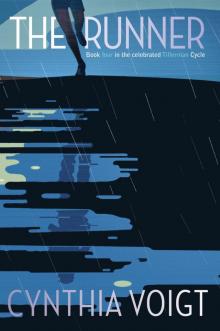 The Runner
The Runner By Any Name
By Any Name Bad Girls, Bad Girls, Whatcha Gonna Do?
Bad Girls, Bad Girls, Whatcha Gonna Do?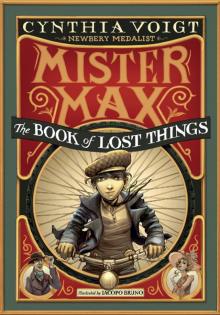 Mister Max: The Book of Lost Things: Mister Max 1
Mister Max: The Book of Lost Things: Mister Max 1 The Wings of a Falcon
The Wings of a Falcon Bad Girls in Love
Bad Girls in Love Toaff's Way
Toaff's Way Building Blocks
Building Blocks Orfe
Orfe Tell Me if the Lovers Are Losers
Tell Me if the Lovers Are Losers It's Not Easy Being Bad
It's Not Easy Being Bad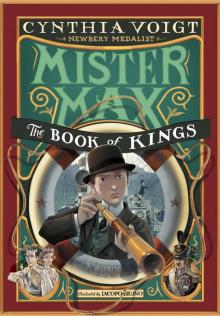 The Book of Kings
The Book of Kings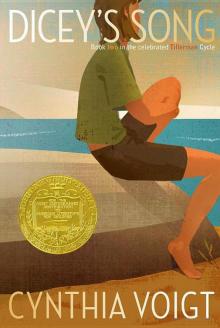 Dicey's Song
Dicey's Song A Solitary Blue
A Solitary Blue Tree by Leaf
Tree by Leaf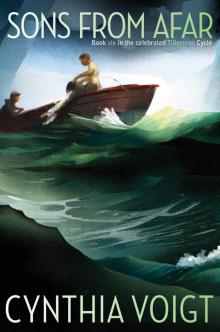 Sons From Afar
Sons From Afar Teddy & Co.
Teddy & Co. Jackaroo
Jackaroo Elske
Elske Izzy, Willy-Nilly
Izzy, Willy-Nilly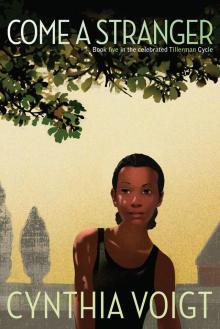 Come a Stranger
Come a Stranger Mister Max: The Book of Secrets: Mister Max 2
Mister Max: The Book of Secrets: Mister Max 2 Seventeen Against the Dealer
Seventeen Against the Dealer The Callender Papers
The Callender Papers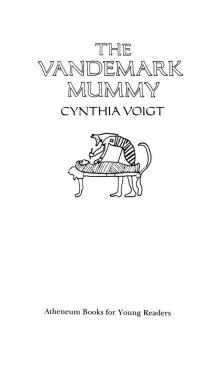 The Vandemark Mummy
The Vandemark Mummy Tale of Birle
Tale of Birle Glass Mountain
Glass Mountain The Tale of Oriel
The Tale of Oriel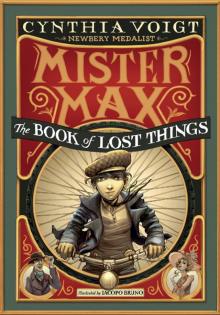 The Book of Lost Things
The Book of Lost Things The Book of Secrets
The Book of Secrets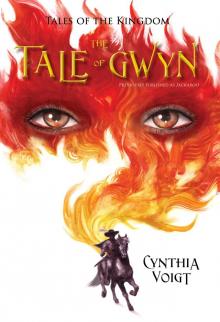 Tale of Gwyn
Tale of Gwyn